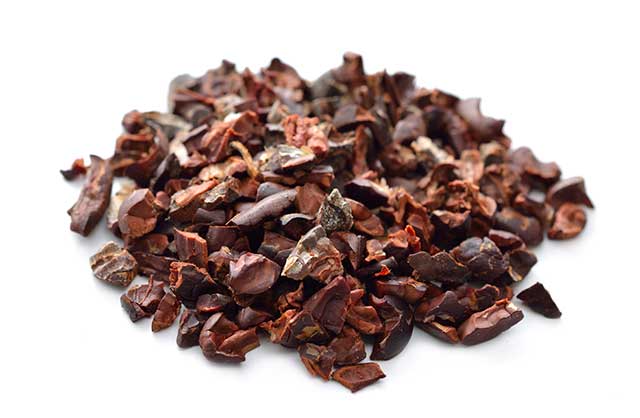7 Health Benefits of Cacao Nibs

The reasoning is simple; they apparently have all the benefits of dark chocolate, but none of the sugar.
However, just how much of the claims are true?
And what can they do for our health?
This article examines seven interesting health benefits of cacao nibs and takes a look at their full nutrition profile.
What Are Cacao Nibs?
Put simply; cacao nibs are pure cacao beans chopped into small “nib” pieces.
In essence, when someone eats cacao nibs, they are eating 100% cacao beans.
Theoretically, this should make cacao nibs healthier than dark chocolate, but there are some nuances to understand, which we will come to later.
Production Process
To summarize the production process, the cacao farmers must first harvest cacao pods from their cacao trees.
Here is a picture of a cacao pod:
After this, the farmers need to remove the cacao beans from their pods, leave them to ferment, and then dry them in the sun for several days.
Following the drying process, the beans may be roasted to give them a fuller flavor or just left in their raw state.
Finally, the beans will be ground down into smaller pieces, which are what we call “nibs.”
The result looks like this;
Health Benefits
Firstly, cacao nibs are not a magical food that will supercharge our health by themselves, so watch out for exaggerated and over-hyped claims.
That said, we will now examine some of the interesting health benefits that they may potentially offer.
1) A Rich Source of Magnesium
Cacao nibs contain a substantial source of dietary magnesium, and a little one-ounce serving provides 31% of the RDA (1).
Magnesium is an essential mineral that plays a critical role in human health, and increased intake is associated with positive health outcomes.
For example, higher dietary magnesium intake appears to reduce the risk of diabetes, heart failure, stroke, and general all-cause mortality (2).
One of the reasons why magnesium is so important is because it is involved in numerous biological processes. Some of these include muscular contraction, vasodilation, blood pressure and insulin regulation (3).
Furthermore, several studies show that magnesium deficiency can lead to cardiovascular damage and high blood pressure (4, 5).
2) High In Fiber
Although cacao nibs are relatively high in carbs, the majority of this comes from fibrous carbohydrate.
100 grams of cacao nibs provide 57 grams of carbohydrate, and a significant 37 grams of this is fiber (1).
Unlike sugars and refined carbohydrates, fiber does not break down into glucose and will not cause a blood glucose spike.
Several studies show that, in the context of a high carbohydrate meal, fiber slows digestion and reduces the blood sugar and insulin response (6, 7).
Fiber may also be important for the health of our gut microbiota, and cacao consumption beneficially affects this microbial colony in animal studies (8, 9).
3) Significant Source of Polyphenols
Cacao nibs are one of the most concentrated sources of dietary polyphenols (10).
A lot of ongoing research is happening on polyphenols, and there are still many things we do not know.
However, researchers believe that these compounds can have beneficial effects on our body.
On this note, several recent studies on cacao polyphenols—including clinical trials—suggest they may enhance anti-inflammatory systems and vascular function (11, 12, 13).
4) Contain Mood-Boosting Chemicals
Cacao nibs contain several interesting compounds that may positively affect our mood and feeling.
These compounds include L-tryptophan (a precursor to serotonin) and β-phenylethylamine, known as PEA (14).
Chocolate has long been associated with “happy hormones” and feelings of happiness, but can cacao nibs improve our mood?
According to studies, the answer is yes.
One particular study looking at this was a randomized controlled trial featuring 72 participants, and it found that daily cacao polyphenol intake over 30 days increased feelings of contentedness and overall mood compared to placebo (15).
5) All the Benefits of Dark Chocolate, But No Sugar
Food products like cacao nibs, chocolate bars, and hot chocolate all offer the same vitamins and minerals in different quantities.
However, cacao nibs are just pure cacao beans, so contrary to most other chocolate products, they contain no added sugars.
Generally speaking, many experts hold the opinion that most people should reduce our sugar intake. For one thing, it is thought that the excessive amounts of sugar in the Western diet contributes to obesity and the wide range of associated health problems it brings (16).
However, it is possible that there may be a downside to cacao nib’s lack of sugar.
Interestingly, it seems that small amounts of sugar may increase the bioavailability and absorption of cacao’s polyphenols (17).
However, combining cacao nibs with a source of fruit (such as berries) could be a healthy way of combining the nibs with sugar.
Alternatively, see this guide to dark chocolate bars.
6) Contains Theobromine
Theobromine is a major phytochemical compound contained within cacao beans, and cacao nibs contain a large amount of it.
Amongst other benefits, theobromine acts as a stimulant that can help to improve focus and mental clarity (18).
Theobromine has some other interesting effects too, and research suggests that it may improve blood pressure and HDL levels.
For further information on this, see this full guide to theobromine’s benefits.
Do Cacao Nibs Contain Caffeine?
Some people believe that cacao nibs (and chocolate in general) contain large amounts of caffeine, but this is a myth.
While cacao is a source of caffeine, it does not contain very much. A typical serving size of cacao nibs may only offer about 10% the caffeine a cup of coffee does.
Notably, the main reason people think cacao contains caffeine is due to the theobromine content.
Theobromine has a similar (but milder) effect on our body.
7) Rich In Iron
When we think about iron-rich foods, red meat instantly comes to mind.
However, some plant foods contain this mineral too, and among these, cacao is the very best source.
In fact, per 100 grams, cacao nibs supply 173 % of the recommended daily allowance for iron (1).
Even per ounce-serving, this still represents an impressive 48.4 % of the RDA.
Iron is an essential mineral, and it plays a key role in keeping our cells healthy, converting food into energy, and DNA repair (19).
Nutrition Facts
As you can probably tell from this article, cacao nibs are extremely nutrient-dense.
For a full overview of their nutrient data, the tables below show the macronutrients, vitamins, and minerals they contain per 100 grams (1).
Calories and Macros
| Amount (kcal/grams) | |
| Calories | 228 kcal |
| Carbohydrate | 57.9 g |
| Fiber | 37.0 g |
| Sugar | 1.75 g |
| Fat | 13.7 g |
| Saturated Fat | 8.1 g |
| Monounsaturated Fat | 4.6 g |
| Polyunsaturated Fat | 0.44 g |
| Protein | 19.6 g |
As shown in the table, cacao nibs are high in fibrous carbohydrates, and they also contain a large amount of protein and fat.
Vitamins
| Amount (% Daily Value) | |
| Vitamin B2 | 18% |
| Vitamin B3 | 13% |
| Vitamin B6 | 9% |
| Folate | 8% |
| Vitamin B5 | 5% |
| Vitamin K | 3% |
| Vitamin E | 1% |
Cacao nibs are mainly a source of B vitamins, but they also contain small amounts of vitamin K and E.
Minerals
| Amount (% Daily Value) | |
| Copper | 426 % |
| Manganese | 239 % |
| Iron | 173 % |
| Magnesium | 125 % |
| Phosphorus | 105 % |
| Zinc | 62 % |
| Selenium | 26 % |
| Calcium | 13 % |
Common Questions About Cacao Nibs
How Can We Use Them?
There are several ways that we can use cacao nibs.
Since cacao nibs are made from 100% cacao beans, they can taste quite bitter, but the first option is to eat them on their own.
Cacao nibs have a crunchy texture, and they are undoubtedly flavorful, but it depends on personal taste preference.
If the taste is too bitter, then here are two more ideas;
- Mix cacao nibs, nuts, and berries into Greek yogurt to create a healthy dessert
- Use them to add “crunch” to any baking products you make
How Do Cacao Nibs Taste?
As mentioned above, cacao nibs can be incredibly bitter, and this is especially true for the raw (“cacao”) variety.
Their overall taste profile is dry, bitter, astringent, slightly earthy, and not sweet at all, and they have an overpowering chocolate flavor.
Where To Buy Them
It is easy to see cacao nibs for sale in any major grocery store or supermarket.
Also, they are a standard product in health food stores (but expect to pay a higher price).
Otherwise, there is a range of options available online.
Final Thoughts
Cacao nibs have a bold and robust flavor which is not for everyone.
However, they offer a lot of nutritional benefits, and they are one of the most nutrient-dense foods around.
For those who are looking for a healthy snack, then these crunchy chocolate nibs are an excellent option.
Related Articles
11 Types of Chocolate and Cocoa Products
Dark Chocolate: Does It Have Benefits?
21 Best Dark Chocolate Bars and Brands
Theobromine: Benefits and Side Effects of Cocoa’s Interesting Phytochemical





8 thoughts on “7 Health Benefits of Cacao Nibs”
Excelente, yo las consumo de haces 4 meses, buen estado de ánimo. Tengo hipertensión arterial con medicamento 140 – 80 ahora 120 – 70 *no puedo afirmar que son las semillas de cacao* pero mi presión esta menos variable
Good to hear!
O gosh I LOVE the nibs & eat them nearly every day‼️ Greek yogurt & fruits topped with nibs or added to my smoothie. The crunch is fabulous, I am so glad I discovered them years ago‼️
Yogurt, fruit and cocoa nibs are a good combination!!
Excellent information
Thanks Evelyn!
Every day, in order to have a treat to look forward to and keep my dieting going, I make a smoothie of frozen organic mango, banana, almond milk, and whatever other fruit I may have…(frozen acai, frozen dragon fruit, frozen strawberries, etc.) I pour the thick mixture intoa glass and top it with some whipped coconut topping and add a teaspoon of cacao nibs and a teaspoon of ground flax seed..I eat it with a spoon like you would an ice cream sundae. . The slight sweetness of the whipped coconut topping mixes with the nibs and makes them taste a touch more like dark chocolate.
That sounds like a nice way to eat them! They are a little bitter on their own.
Comments are closed.